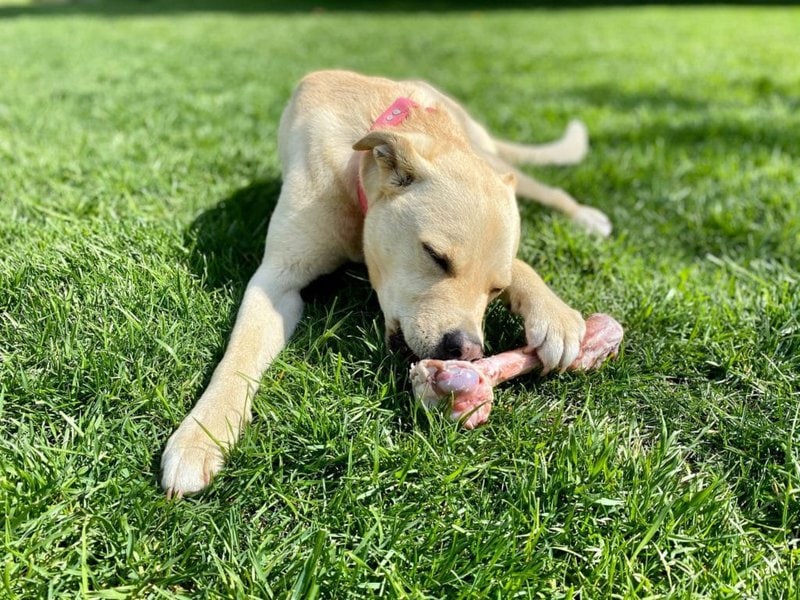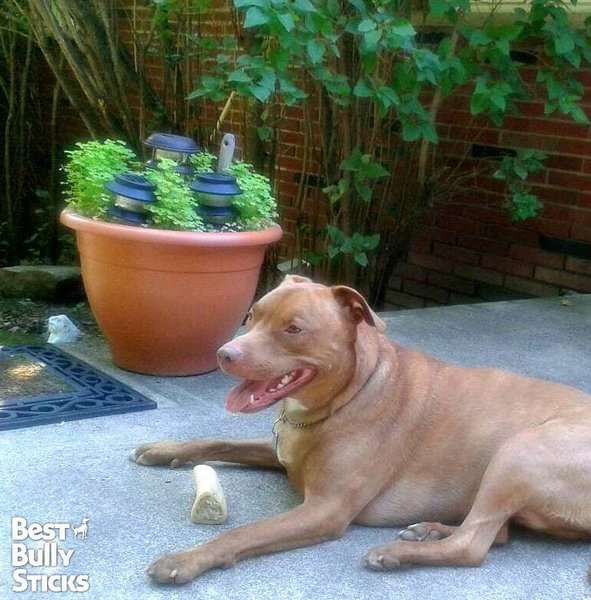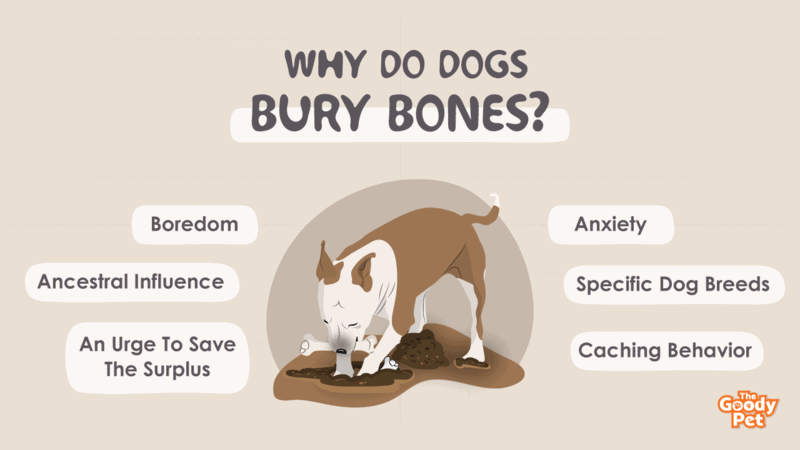Dogs love burying things. While most dogs bury things and are essentially hoarders, some dogs are a bit more compulsive to this behavior than others. Sometimes it may be finding a bone or toy dug up in your backyard or garden, and other times it may be simply finding your phone under your couch. Although these things seem different, they are actually influenced by the same thing. So, why do dogs bury items?
Dogs bury bones mainly for survival reasons. They have a natural instinct to keep things safe and protected, especially things they find valuable, regardless of whether they own them or not. As humans, we may find this behavior odd, and it is a natural wonder as to why dogs invest so much energy in burying their treasured items. It can also be pretty frustrating when the dog damages your well-maintained backyard.
Like so many dog behaviors, the burying bones behavior is firmly rooted in ancestry. Following the ancestors’ footsteps, dogs use their own front feet to dig out an area in the ground, then bury the treasures, causing us to wonder why your dog keeps burying bones, toys, treats, or other food items.
Discover the most common reasons why this happens and how or if you need to stop the behavior.
Why Do Dogs Bury Their Bones Or Other Food Items?
Generations ago, dogs used to hunt their meals and bury them to keep them fresh and protect them from predators. But why do modern dogs still bury their food now that they are domesticated?
Of course, domesticated dogs don’t have to worry about food, as they are always provided with daily meals. But why do they still bury bones and other food items? Here are some of the reasons;
Ancestral Influence
The ancestor domestic dogs lived on a diet known as “famine” or “feast,” which most modern dogs still do. Although they require meat daily, they don’t always get it. However, when they do, they tend to feast since they know they won’t be able to get another one in the next few days.
Furthermore, this also makes them not want to waste the meal by leaving it there once they are full. Instead, they choose to bury their food on the ground. The soil protects the meat from the sun, making it last longer. When there is scarcity, the dog will return to the spot and dig up to get the meal.
Natural Instinct
Most dogs are fed daily, probably twice a day, and they won’t need to hide the food for a scarce day. However, for some dog breeds, burying resources is a part of their natural survival instincts, just like herding or hunting.
Some of these dog breeds will have this instinct more than others. For example, dog owners with hunting breeds are more likely to see this behavior more than owners with non-sporting or herding breeds.
As part of their hunting instinct, dogs bred for hunting do have the desire to save their resources and are more likely to bury bones. Dogs will bury anything they consider valuable, and this includes food because of their natural instinct to keep valuable things protected and safe.
An Urge To Save The Surplus
Giving your dogs too many resources, including food or treats, will make them save the surplus for later. As a way to satisfy the need and urge to save the surplus, your dog tends to bury the bones, treats, or other resources. If your dog is burying bones because of surplus resources, then you can curb this behavior by making the resources scarcer.
Specific Dog Breeds
While almost every breed can bury bones, some are more predisposed to burying than others.
Some of these breeds include Basset Hounds, Miniature Schnauzers, Terriers, and Dachshunds. As mentioned earlier, hunting breeds like Dachshunds are more into this behavior as compared to herding breeds like shepherds, sheepdogs, and Border Collies.
Hunting breeds have a stronger desire to save their bones and toys, including spaniels, retrievers, and labs. For example, Carin Terrier, which was originally bred for hunting and chasing, has excellent digging skills and the instinct to search.
Since such breeds have the instinct to dig, they also have the urge to save their resources, so they are more likely to bury bones. However, all dogs have the potential to dig and bury their bones, regardless of the breed.
Boredom
Dogs need mental and physical stimulation daily. So, it is no surprise that dogs lacking stimulation will always find a way to occupy themselves. Unfortunately, most times, dogs pick up a behavior that is undesirable to humans, which includes digging and creating holes in your backyard or garden.
Eventually, these holes will serve as additional storage compartments where they bury their favorite toys or the bone or treat you just gave them. To prevent your dog from engaging in this kind of behavior, provide daily stimulation activities to engage their body and mind.
For example, you can play games of hide-and-seek or fetch and tug, engage them in a fun trick using positive reinforcement, or take them for walks and allow them to sniff around. Get a daily routine to practice the basic skills with your dog as it helps stimulate their minds.
Ensuring your dog has lots of amazing opportunities to use the body and brain will go a long way in making sure your dog doesn’t turn your garden or backyard into a bone burial ground.
Anxiety
Anxiety and stress are factors that can play a huge role in the burying bones behavior. When a dog stays in a stressful environment, it may make them feel anxious, and to calm themselves down, some will engage in digging because it is a self-soothing behavior.
If a dog has lived in a previous situation in which someone or something took valuable things away from them, then they are more likely to try and hide the valuable things. Additionally, if a dog won’t feel safe in the area they are fed in, or where they are at the moment, they may bury the food to eat at a more comfortable time.
This is especially true in multi-pet households or among other dogs recently adopted. However, if you ensure your dog feeds on a consistent schedule, and once it feels safe around the environment, then this might improve.
In severe cases, like when the dog hides all types of items, then you might need to consult a certified veterinary behaviorist or a canine behaviorist consultant.
Caching Behavior
Caching involves the process of storing the available meal to consume later. It is common in mammals and most birds. So, instead of your dog eating all the food you have provided, it will save some of it for later snacking.
Stashing the food in the soil is a great way to keep other animals from consuming it, as the smell remains hidden, and also a way to ensure the food remains fresh. For most times, caching valuable things isn’t something to be concerned about.
However, if your dog constantly tries to bury all the food you provide or won’t consume any treats or food in front of you or other pets, then that’s something to worry about. Always pay close attention to the dog’s body language after you give them food and before they go to bury their food.
What Does It Mean When Dogs Bury Their Treats?
There are many reasons why dogs bury their treats, with the most common one being you’re giving them too much. Other reasons include the instinct to bury food because of fear of starvation or to protect their treats from predators.
Even if you’ve been feeding your dog constantly for several years, that won’t remove their natural urge to ensure their future feeding needs are catered for. Sometimes they may want to bury their treats because they are too good to consume all of them at once.
All in all, the burying behavior in dogs is instinctual. So, it is not strange to wonder if dogs can remember where their burying spots were. Let’s find out in the next section.
Will Dogs Remember Where They Bury Their Bones?

Most often than not, dogs will remember where they buried their bones. Moreover, dogs have remarkable ways of remembering where they buried the bones and choosing which ones to dig up.
How Do Dogs Remember Where They Bury Bones?
In general, dogs use two main types of memory to find out where they buried their bones: Spatial Memory and Associative Memory.
So, let’s find out in detail the common ways dogs remember their burying spots.
Spatial Memory
Spatial memory helps dogs remember where they left their bones. The dog’s brain uses this type of memory to map out the places it normally visits and the home. For instance, this memory helps the dog remember where the water or food bowl is.
It also helps them remember the good places (where there are humans that can cuddle with them or where the food is) and bad places (bathing or vet rooms). In addition, research has shown that this memory reminds them where they hid their food and also the type of food that they hid there.
Dogs can choose when to retrieve their food or to retrieve the meal they enjoy first. So if your dog has buried something, they are more likely to use spatial memory to find where and what treats they buried.
Associative Memory
The associate memory helps dogs remember the sights and smells that are directly linked to the process of burying the bones.
Generally, dogs lack a good memory for remembering unexciting events or random things from day-to-day activities. A study shows that dogs will forget unimportant events in approximately two minutes.
This memory helps them remember the bad (something they don’t want to experience again), good (something they want more of), and neutral (nothing they should worry about and might choose to ignore) experiences with their senses. They have the ability to smell a lot, taste things, feel or see objects, and hear sounds.
Most things they experience are pretty common, and they tend to forget them. However, if a dog is introduced to a new place, sound, food, or object, it will take the experience and associate it with either being bad or good.
Associations are one of the best ways for dogs to remember things. For example, when dogs bury bones, they associate it with the smell and sight of the area and mark it as a good experience.
Passing through the area and smelling or seeing the bone might trigger the associated memory of the bone. As a result, the dog digs it up and enjoys the meal.
Strong Sense Of Smell
Sometimes, dogs don’t really need to remember where they hid the bones. Most dog breeds have an amazing sense of smell that can sniff and discover a bone hidden in the soil. In fact, some dog breeds are able to smell objects that are as deep as 15 feet, and they help the police recover buried bodies of bones.
While this burying behavior can be a bit scary and uncomfortable to humans, is it really something one should worry about?
Is Burying Bones Harmful To Dogs?
Burying bones is a natural behavior for dogs and is not harmful. However, constantly digging into the ground may cause problems for the dog.
For example, their paws may become sore and painful plausibly due to an injury as they are exposed to harsh chemicals in the soil.
How Do You Stop Burying?
Before you try to stop burying, it is important to note that this behavior can happen because of a number of reasons and motivations listed above. As a result, you need to find the motivation to stop burying effectively.
Here are some of the best ways you can use to stop burying;
Mental And Physical Stimulation
Make sure you provide the dog with appropriate outlets for their energy, for example, adequate playtimes, scheduled walks, positive training techniques, etc.
When you’re not around, leave the fun toys out to ensure your dog remains busy. To avoid boredom and keep their sole playtimes interesting, ensure you rotate their toys every now and then.

Make It A Game
You can convert the act of burying bones into a fun game. Since burying bones is a dog’s natural instinct, you can provide opportunities to bury what you ask rather than your valuable items. This helps the dog learn about what is okay to bury and what’s not.
Alternatively, you can make it a game by encouraging them to get the bone once they have buried or hidden it. You can do this by teaching them a command like “Go get it.” This is a great game to help stop the burying as it is less destructive and satisfies their natural instincts of burying valuable items.
Get The Dog’s Attention
Sometimes if your dog is burying things out of boredom, all they need is your attention. You can call out your dog’s name to get their attention or find other ways to get your dog’s attention.
Limit The Access To The Bones And Other Food Items
If you give your dog too much food, it will probably bury the surplus to save some for later. By limiting the quantity and providing a variety of food items, the dog’s urge to bury treasures may be reduced. When it comes to toys, consider giving the dog one or two toys at a time so that they don’t feel like they have excess that needs to be saved.
Also, avoid giving your dog excess treats and bones after meals when the dog isn’t necessarily as hungry. You will only be allowing your dog to bury and save some for later when hunger strikes. Additionally, ensure you’re giving the dog the right bones and always supervise.
Burying In A Designated Spot
When your dog doesn’t stop burying bones, you can choose to encourage burying the bones in a designated spot like a pillow pile, a doggie blanket, or a specific spot in your yard. This is to ensure your dog’s instinct is satisfied and your yard or garden doesn’t suffer.





